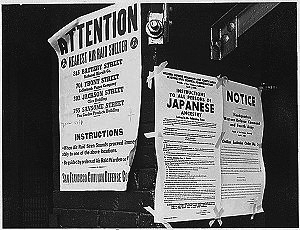Last Sunday marked an anniversary of infamy for American freedom. That sunny day in the South Valley marked 70 years since President Franklin D. Roosevelt gave the U.S. military broad powers to force 120,000 American citizens to leave their homes and possessions to be relocated behind the barbed-wire fences of concentration camps in desolate locations. I consider Roosevelt’s decision on Feb. 19, 1942 to sign Executive Order 9066 one of the most atrocious failings by a U.S. president in upholding America’s traditions of freedom and democracy.
Many argued then – as some argue now – that the president was required to place American citizens of Japanese ancestry in internment camps during World War II as a national defense measure. Roosevelt defended his decision by saying the “successful prosecution of the war requires every possible protection against espionage.” Refuting that argument is the fact that there was never one proven case of a Japanese-American citizen during the war participating in an action of sabotage, espionage or otherwise assisting the enemy. Considering the evidence that has emerged in recent decades, the true reason for the “evacuation” of Japanese-American citizens was racism and a desire by some to suppress economic competition.
Not long after the evacuation started, and many of these citizens, including families in the South Valley region, were rounded up and taken to assembly centers. A music teacher in California’s San Joaquin Valley wrote these words as part of a three-page statement he presented to U.S. Army officers at a hearing at the Presidio military base in San Francisco:
“True democracy, while recognizing the right of the majority to rule, is also unique in the position established by the fathers of this country in recognizing the rights of the minority. That is the reason why the really democratic form of government is superior to all others. Democracy recognizes the right of the individual to freedom of conscience and religious worship. That right must be carefully guarded by all Christians and believers in true democracy. The spirit of democracy in this respect must not be destroyed in times of national stress or emergency. It is far too valuable to be lost by the efforts of those who have forgotten the real value of life.”
I happened to come across the document containing those words while going through a box of old papers. The irony struck me that I found the testimony the day before the 70th anniversary of President Roosevelt’s signing of Executive Order 9066. The document had a double impact on me because I am reading the book “The Muslim Next Door: The Qur’an, the Media, and that Veil Thing” by Sumbul Ali-Karamali. As an event for the Silicon Valley Reads program, I’ll conduct a public discussion of the book at the Morgan Hill Library on March 10.
Sept. 11 is my generation’s Pearl Harbor. The surprise attack by terrorists 10 years ago and its aftermath has parallels with the Japanese military’s strike on the U.S. Navy base in Honolulu and the hysteria that spawned injustice for Japanese Americans. As part of the aftermath of Sept. 11, our nation is dealing with religious prejudice toward Muslim Americans. This prejudice has prompted some politicians to stir up the hysteria of 9/11 and promote legally sanctioned discrimination, in the form of anti-Sharia laws, against those who follow the faith of Islam.
Political representatives in more than a dozen states have worked on legislation to outlaw traditional Islamic laws in the United States. Congresswoman Michele Bachmann has advocated the suppression of Islamic religious law, stating that the intention of Muslims is to “usurp” the U.S. Constitution with Sharia. And Republican presidential candidate Newt Gingrich has told supporters “Sharia is a mortal threat to the survival of freedom in the United States and in the world and we know it.”
Let me tell you about that teacher who wrote the statement for the U.S. Army hearing. He was a proud Republican because he believed that his political party exemplified the legacy of Lincoln, a legacy of liberty. That man was my father, Raymond Cheek. By the end of 1942, my dad would go to the Tule Lake Internment Camp in a high desert valley near the California-Oregon border to teach music to young Japanese-American children behind barbed-wire fences because they were considered enemies of the United States.
America is an exceptional nation. In our past, we have risen above our racial and religious bigotries. To uphold our traditions of freedom and democracy, we must remember to do so again.










